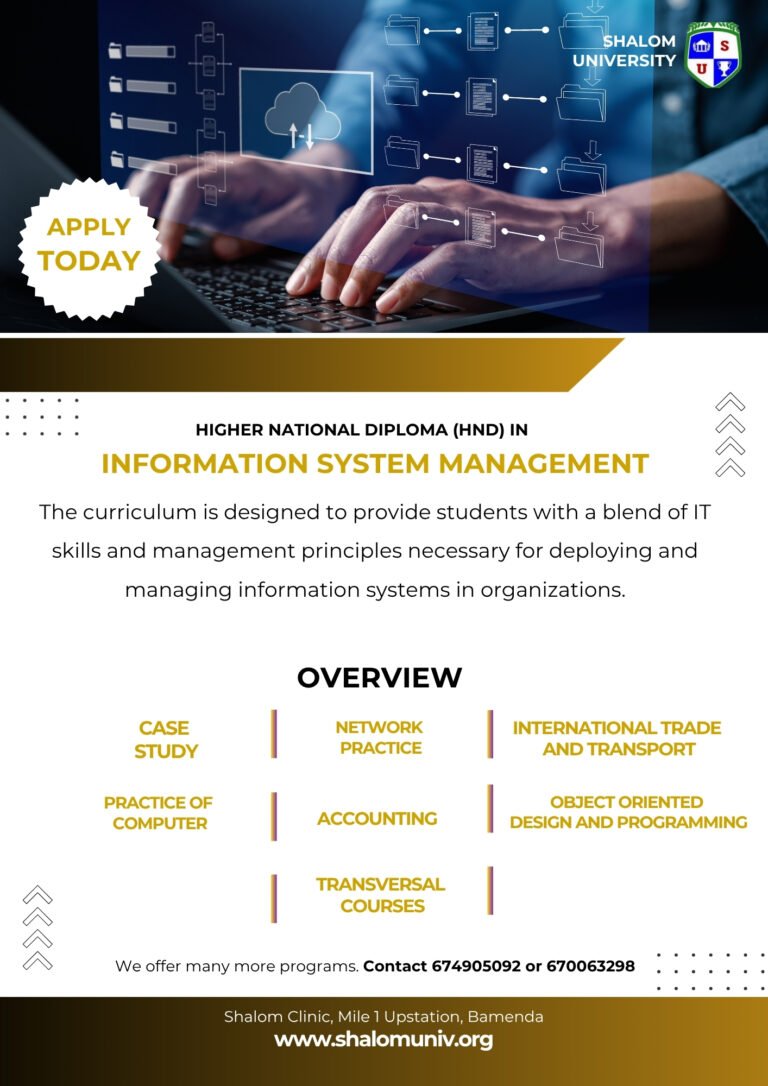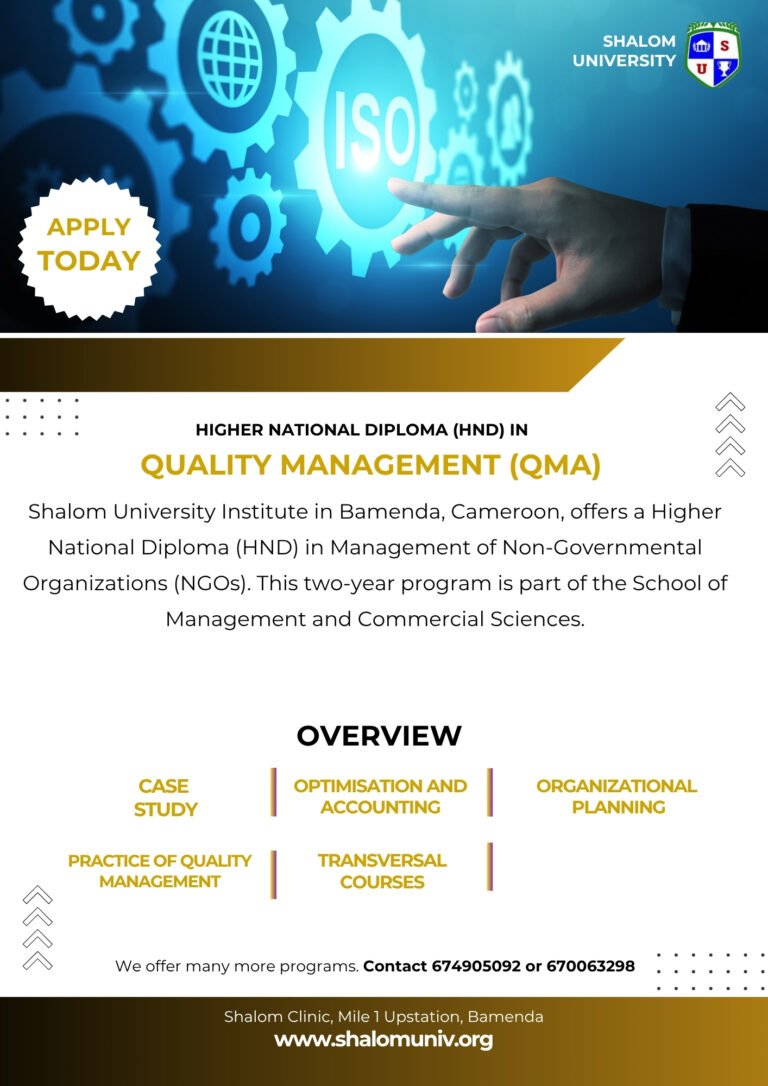In Cameroon’s dynamic and evolving economy, from public works and infrastructure to entrepreneurial ventures and development projects, effective project management is a critical skill for success. Projects, by their very nature, are complex undertakings that require careful planning, execution, and oversight to achieve their objectives on time and within budget. The HND in Project Management (PMA) at Shalom University in Bamenda offers a specialized program designed to train future project managers with the strategic and practical skills needed to navigate this complex landscape.
The curriculum at Shalom University is tailored to the Cameroonian context, where projects often face unique challenges related to resource availability, logistical complexities, and community engagement. Graduates are prepared not just to manage tasks but to lead initiatives that drive growth, create value, and achieve specific outcomes for businesses, government agencies, and non-profit organizations across the nation.
The PMA Curriculum at Shalom University
The HND in Project Management program at Shalom University is structured around a set of core papers that provide a comprehensive and practical education in the field.
Paper: Case Study
The Case Study paper is a vital component that integrates all the theoretical knowledge and technical skills gained throughout the program. It challenges students to analyze complex project scenarios, from managing a large-scale construction project to implementing a community-based development initiative. This is particularly relevant for project managers in Cameroon, who must often adapt to dynamic market conditions, cultural nuances, and logistical constraints.
The course trains students to:
- Analyze real-world project challenges: Based on a given case, students must evaluate the operational, financial, and human resource challenges faced by a project in a Cameroonian context.
- Identify risks and opportunities: They pinpoint specific risks related to timelines, budget, scope, or stakeholder relations and identify potential opportunities for project improvement or innovation.
- Propose evidence-based solutions: Students formulate practical recommendations based on project management principles, risk analysis, and stakeholder management techniques. For example, a case study might involve a road construction project facing delays due to community issues, requiring a proposal for effective stakeholder communication and conflict resolution.
- Defend their decisions: During formal presentations, students must justify their analysis and proposed solutions, demonstrating their critical thinking and communication skills, which are essential for effective project leadership.
Paper: Practice of Project Management
This paper focuses on the hands-on, practical application of project management principles, providing students with the tools and techniques needed to execute projects effectively. It covers the day-to-day responsibilities and tasks that a project manager undertakes to ensure project success.
Key topics include:
- Tools and Methodologies: An introduction to various project management tools and methodologies (e.g., Gantt charts, critical path method, Agile principles).
- Resource Allocation: Techniques for effectively allocating and managing project resources, including people, equipment, and budget.
- Stakeholder Communication: Strategies for effective communication with project sponsors, team members, and external stakeholders.
- Risk and Issue Management: Implementing processes for identifying, tracking, and mitigating project risks and issues as they arise.
- Quality Management: Techniques for ensuring that project deliverables meet specified quality standards.
Paper: Project Development and Management
This paper provides a holistic view of the project lifecycle, from initial concept to final closure. It covers the strategic and tactical decisions involved in developing a project proposal, securing funding, and overseeing its implementation.
The curriculum covers:
- Project Identification and Selection: How to identify promising project opportunities and select those that align with organizational goals and market needs.
- Proposal Writing and Fundraising: Developing compelling project proposals and understanding how to secure funding from various sources, including donors, investors, or government agencies.
- Scope Management: Defining and controlling the project’s scope to prevent scope creep and ensure focus on the core objectives.
- Time and Cost Management: Techniques for developing and managing project schedules and budgets effectively.
- Human Resource Management: Leading and motivating project teams to maximize productivity and achieve project goals.
Paper: Project Analysis and Marketing
In the modern project landscape, projects must be developed with a clear understanding of market needs and have a robust marketing strategy for their outcomes. This paper equips students with the skills to analyze market conditions and effectively promote project results.
Key areas of focus include:
- Market Research for Projects: Conducting market research to validate project ideas, understand target beneficiaries or customers, and assess project viability.
- Feasibility Studies: Performing financial, technical, and social feasibility studies to evaluate a project’s potential for success within the Cameroonian context.
- Marketing the Project: Developing strategies for communicating project objectives, progress, and outcomes to stakeholders, including beneficiaries, donors, and the general public.
- Impact Assessment and Reporting: Methods for assessing a project’s impact and communicating results clearly and persuasively.
Driving Growth and Success
Graduates of the HND in Project Management from Shalom University are well-prepared to take on leadership roles in a wide range of industries in Cameroon. They can serve as Project Coordinators, Assistant Project Managers, or contribute to project teams in construction, IT, non-profit, or business sectors. The program’s strong focus on practical skills, strategic thinking, and the Cameroonian context ensures that graduates are not just theoretically sound but also adept at applying their knowledge to solve real-world problems. By providing a comprehensive and relevant education, Shalom University plays a significant role in nurturing the project management expertise crucial for the nation’s continued growth and development.




